An anchor has two purposes, not one.
First, an anchor allows you to be "anchored" when you need to stop.
Stopping, is not a sign of weakness.
Stopping is a sign of growing up, because you now know the price of not stopping.
We experience this pause, involuntarily everyday. Thankfully, sleep does not need our consent.
We just need to be body-wise.
To let the body do what the body needs to do.
Second, knowing that you have an anchor allows you the peace of mind to travel afar.
We don’t think of anchors as a thing to help you move.
We think of anchors as a thing to help you stop.
Do you ever notice people who wander around floating from one thing to another, with no anchors in their lives?
Can you recognise moments in your life when you have nothing to ground you?
We are all in the ocean of time and memory formation.
Anchors come in many forms. From the mandate activities of habits and routines, to the sacred acts of rituals and religious practices. Anchors are not just subjective, but collective in the human need to be grounded on the same earth.
People, Place, and Purpose.
Deep inside us, people, place, and purpose are our inner-anchors, grounding us to the present and propelling us to a future.
People: The ones you love, the ones you look after, the ones that were your guides/mentors.
Place: An embodied presence to a physical (not virtual) location.
Purpose: A sense of where you are going and why you are going there.
It’s no surprise when we lose a connection with people, place and purpose, we feel disoriented, displaced and disembodied.
Power, Prestige, and Possession.
We can get lost when we are de-anchored from people, place and purpose by the pull of power, prestige, and possessions.
Never under-estimate these possessive powers at play.
Power: The need to be in control, to be right, and always effective, ex-communicating any notions and tolerance of uncertainty and letting go.
Prestige: The need for recognition and status. Wanting to be seen as caring or humble can actually be a form of status-seeking behaviour. Prestige can come as wanting to be seen as high-status and rich—or even wanting to be seen as poor.
Possession: The cling to ownership of things and driving away from our own shadows, as a function of rejecting the inner-poverty that is experienced within.
“People, Place, and Purpose” can actually be guises of power, prestige, and possession. For instance, we can become possessive of people we care about. We can seek power and dominance over a place—even an office cubicle. And we can seek relentless control over our daily lives, all in the name of “purpose.”
Author Peter Kreeft wrote,
Sometimes proud people talk about how bad they are, and that’s a form of pride too, a dangerous one because it’s camouflaged.
We can fall for these illusions.
From the cars we drive, the way we interact with others, to the thoughts that occupy our minds, the seduction of power, prestige and possessions are ever present.
When we become dis-illusioned from these, we fall flat.
And it’s not a bad thing.
To be dis-illusioned is to stop projecting a falsehood into the world. It is to stop projecting a persona that you want others to see.
To be disillusioned is to let the facade crumble.
It’s an invitation to reality. It’s a fertile time to re-think, re-orient, and develop anchors, because now you see more clearly.
When we lose the illusions, we become humbled.
The etymology of “humble” is related to “humus,” which means earth.
Humility anchors us back to the ground.
How do we learn to be humble? For starters, learn to laugh at ourselves.
~~~
If you want to go somewhere in life, never underestimate the need for an anchor. We can find them in learning to pause, in our relationships, communities and our dedication to a purposeful life.
And never underestimate that you might just be an anchor for someone else.
Crossing Between Worlds is now available in all good bookstores.
Daryl Chow Ph.D. is the author of The First Kiss, co-author of Better Results, and The Write to Recovery, Creating Impact, The Field Guide to Better Results, and the latest book, Crossing Between Worlds.
If you are a helping professional, you might like my other Substack, Frontiers of Psychotherapist Development (FPD).







